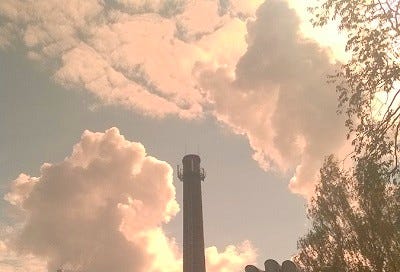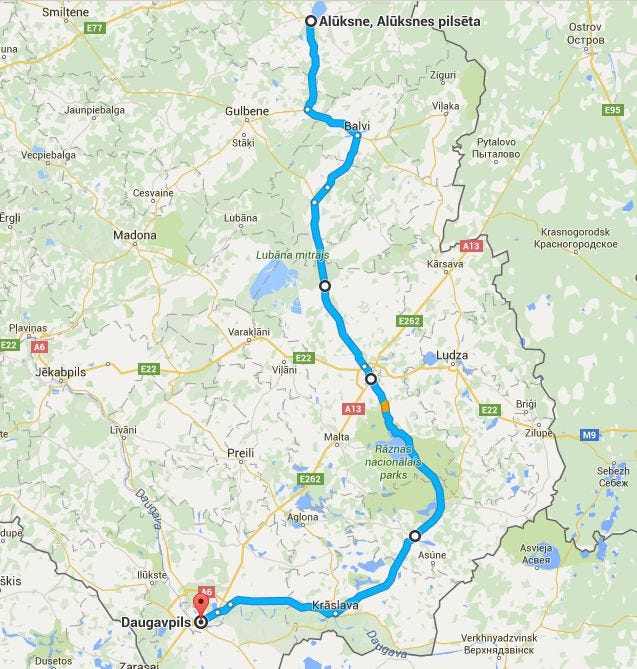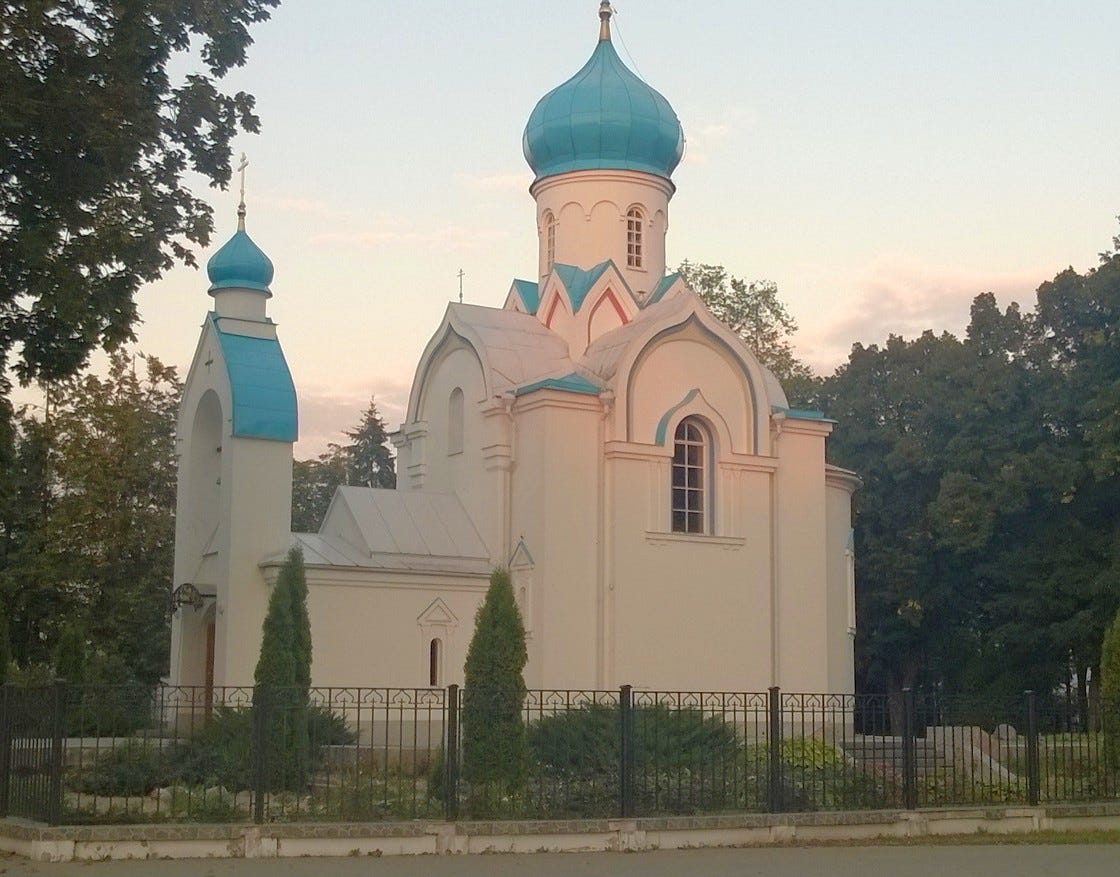Lights and shades of Latvia; blessed backwardness!
Like travelling back in time
A petrol station. I fill up the tank and enter the shop. When tending my credit card to the cashier, she looks scared and steps back, hiding her hands behind her back, as if I had produced a scorpion. Maybe she has never seen a Mastercard, for she refuses to take it. So I pay cash and leave. They're mistrustful, these Latvians; particularly in gas stations, as it seems, because I had once to leave without fueling.
It's a splendid day's morning, sunny but not hot, thanks to a thin veil of clouds. 21 ºC. Though September has but begun, fall has already come to this land. Trees begin losing their leaves and there are superb landscapes along some of the roads I'm riding on: woods and sown fields, farms and grooves, fallow plots and ploughed lands, a pictoresque and varied countryside that beautifies my journey. Sometimes I roll under a slow, playful dropping of yellow leaves that fall from the trees, touching my helmet or whirling around Rosaura's turbulence. Every now and then a ranch. In this part of the country, outdated farming machinery is still used which nowhere else in Europe can be found except inside ethnographic museums; and that all makes Latvia far more appealing to me. However, I travel these regions withoug really understanding much about anything, because of the language. Not knowing a word, it's hard to even begin knowing what the Baltic societies are up to. They seem to me very Iron Wall-like, but I may well be wrong.
Talking about languages, I'm all the time wondering: what do Baltics expect with their three rare, minoritary and dissimilar languages? Estonian — well — that one can still do, since, being akin to Finnish, is thus backed —so to say— by another five million speakers; but Latvian and Lithuanian? They're the two most arcaic Indoeuropean living tongues on the planet, not mutually inteligible and only spoken by two and three million people respectively. Have you ever heard about somebody who studies Latvian, or who knows anyone studying it? Who would? [Note: as turns out, one of my readers studies Estonian and Lithuanian.] Most of all when, in all three nations, everyone understands also Russian, which is very widespread. Who's going to study —say— Lithuaninan for getting a job there, when he can all the same study Russian and go work all over Asia and Eastern Europe? There's very little future I'm afraid, if any, for those 'small' tongues in this global world. Needless to say, same goes for Basque, Catalonian, Gaelic and many others.
With its urban layout quite different from the usual one (at least in Europe), Rëzekne is a strange city: the very centre consists of a square-lined town with old wooden houses on garden plots, miraculously untouched by modernization, plus a few one-block parks. It seems to me a little rough district; very few people around, almost no shops and no cars. Then, as a ring around this quarter, downtown proper has grown, where you find all the commerce and most of the people, public transport, etc. I wonder what kind of developement has taken place here.
But Rëzekne is not my destination for today. I'm going further south. So, from here I pick the less beaten track, which goes across the Razna National Park. Thence, I'll follow to Kräslava (only 10 km away from Belarus), where I hope to find accommodation. In some parts of this route, Latvian countryside is very captivating: for as far as I can see, often there is not a single evidence of progress; it's as though, fifty years back, they had got stalled in time: houses, barns, stables or stores are all old wooden, usually painted in bright colours, yellow, ochre, brick red, etc., in a naïve attempt to visually making up for sun; the lean little tractors, the outdated winnowing machines and rusted threshing machines, the hayricks... nothing here seems to evidence the new millennium.
I arrive to Kräslava, but can't find any of the accommodation places shown on my maps, nor even those advertised on the several information boards in town: everything is closed down, probably recently, when the Euro came. Well, not all: after much searching, I find one of them in an ugly, single-storeyed concrete house close to the river. Instead of a neon or even a sign, there is just a notice written on a paper behind the window: Lodging. And anyway it's closed too. I have no option but keep riding and try better luck in Daugavpils.
All right, here I am in Daugavpils. Finally no tragedy today, but it's been one of the longest rides this journey: 260 km — Rosaura's odometer says. This is the second most populated city in Latvia, and for that matter a rather big one for this part of Europe. Road traffic gets busier 8 km before arriving. Crossings, dormitory suburbs (quite dull and soulless, by the way, and rough-looking too), traffic lights and a thick web of railroads on the outskirts, all of which make for a lousy traffic. But then, once inside, Daugavpils turns out to be quite fine: wide streets with nice buildings, lots of green, gardens, large backyards and that kind of urban elements that create a pleasant impression of space, quite the opposite of an anthill. Then, much of the housing and many other buildings (from 19th century I guess) are fairly outlined and even classy. Reminds me the fine districts of many Polish towns. And, same as Rëzekne, this place seems to be taken by the Russians: that's the prevailing language I hear around.
By the way, it's not so easy to find accommodation here either: alike Kräslava, information is outdated. Most of the old hotels don't exist any longer. Probably global fashions have done with them. Finally I end up at a Russian's, fiscally pirate I'm sure, whose landlord doesn't speak a word of English — nor of Latvian, probably. But we understand each other because the deal doesn't take a lot of brain work: this is the room, how much, ok. No guest registry, no receipt, no nothing. Give me the money and here's the key. Now, when he realizes I'm travelling by motorbike, he finds me a pretty safe plece where to store Rosaura for the night. People are nice, after all. Even Russians are. Anyway, despite some of my previous comments and the modernity, when you scratch a little these Baltic states the enamel flakes off and there shows, underneath, the Eastern Block. Like for instance the main city transport here: besides the rattly old tramways, there are those —typically yellow— small buses, so popular in Russia and Ukraine, called mashrutka.
What I can't find anywhere, after much walking around, is local food restaurants. None at all. Everything here is either a burguer, a kebab place or a pizza parlor. If there is, or was, such thing as Latvian food, they must be keeping the recipes a secret to themselves…
* * *
It's getting dark. Because I'm now travelling south and the equinox is coming nigh, along the last week or so nights have become much more 'reasonable', to my great relief. In countries like this, where windows have no blinds, the long boreal days worsen my insomnia. Now dawn is around seven and dusk around nine, and that's the way God wants it to be.






